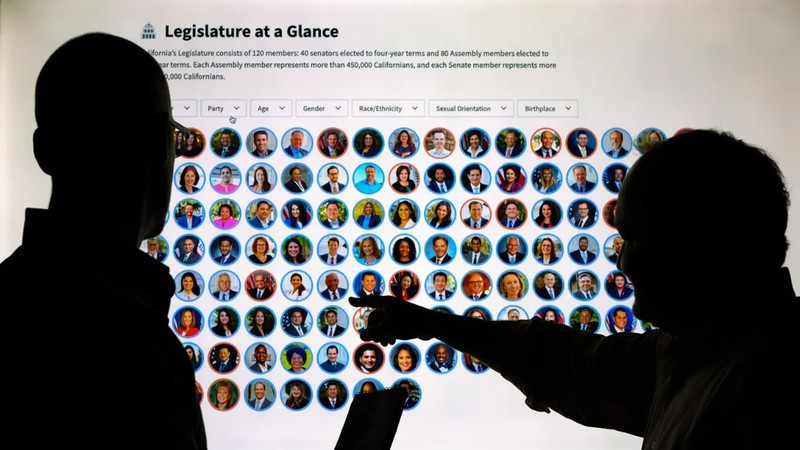In an analysis of more than 1 million votes cast by current legislators since 2017, CalMatters Digital Democracy reporter Ryan Sabalow and CBS Sacramento reporter Julie Watts found that Democrats vote “no” less than 1% of the time on average.

Digital Democracy reporter Ryan Sabalow, left, and CalMatters senior editor Dave Lesher review a Digital Democracy page in the CalMatters newsroom on April 3, 2024. Photo by Fred Greaves for CalMatters
BY LYNN LA, for CalMatters
For those in the Legislature’s Democratic supermajority, voting “yes” on a colleague’s bill may come easily. Voting “no,” however, isn’t as straightforward — and that may be why so few Democrats actually do so.
In an analysis of more than 1 million votes cast by current legislators since 2017, CalMatters Digital Democracy reporter Ryan Sabalow and CBS Sacramento reporter Julie Watts found that Democrats vote “no” less than 1% of the time on average. Monterey Park Assemblymember Mike Fong, for example, has voted more than 6,000 times since being elected in 2022, and never once voted “no.”
As the opposition party, Republicans unsurprisingly vote “no” more often — an average 21% of the time.
In lieu of voting against a bill, legislators will often decline to cast a vote. Last year, at least 15 bills died because of a lack of votes.
Why don’t lawmakers go on record with their objections?
While the Democratic legislators contacted by CalMatters wouldn’t talk about it, not voting is a common tactic for lawmakers. They may want to avoid drawing the ire of their colleagues or activists, or may want to stop a bill’s momentum without directly voting against it.
This can leave advocates infuriated. Regina Chavez, who has pushed for fentanyl-related legislation after her 15-year-old daughter died from the drug in 2022, said she was “personally” insulted when Democrats last year refused to vote on the bills.
To learn more about the power of never having to say “no,” read Ryan and Julie’s story.
Many legislators don’t say no to gifts and free travel, however. As CalMatters data reporter Jeremia Kimelman explains, gifts to lawmakers last year totaled more than $330,000 — more than double compared to 2022.
According to their analysis, about $24,000, or nearly 20%, came from Democratic leaders, mostly in the form of food and drinks at policy retreats. Former Assembly Speaker Anthony Rendon, for example, was the third most generous, doling out $16,000 worth of food and jackets to 19 lawmakers.
Sponsored travel is also on the rise. In 2023, more than 100 groups spent about $1.1 million to fly lawmakers around the globe, compared to 85 groups and $950,000 in travel the year before. The largest trip sponsor was the California Foundation on the Environment and the Economy, which spent about $375,000 on “study tours,” where legislators and state officials learn about policy from other government leaders or businesses. And while one 2015 law seeks to make lawmakers’ trips more transparent, it has largely been ignored.
Read more about gifts and travel received by legislators in Jeremia’s story.
These two stories are part of a groundbreaking new initiative: Today, CalMatters is launching Digital Democracy, a project using the latest technologies to help Californians understand their state government and create more accountability for politicians.
The website introduces each of the state’s 120 legislators and explains this year’s policy agenda. In our unprecedented database, you can instantly find any word uttered in a public hearing, every vote cast, every bill introduced and every dollar donated. Finally, artificial intelligence will generate story ideas for reporters throughout the state. “This has the possibility of transforming how newsrooms cover state government,” said Dean Baquet, former editor of The New York Times and a board member at CalMatters. For more details, see our about and methodology pages and read more from our engagement team.
CalMatters.org is a nonprofit, nonpartisan media venture explaining California policies and politics.
Articles which extol the virtues of a report or article put out by a local newsroom.